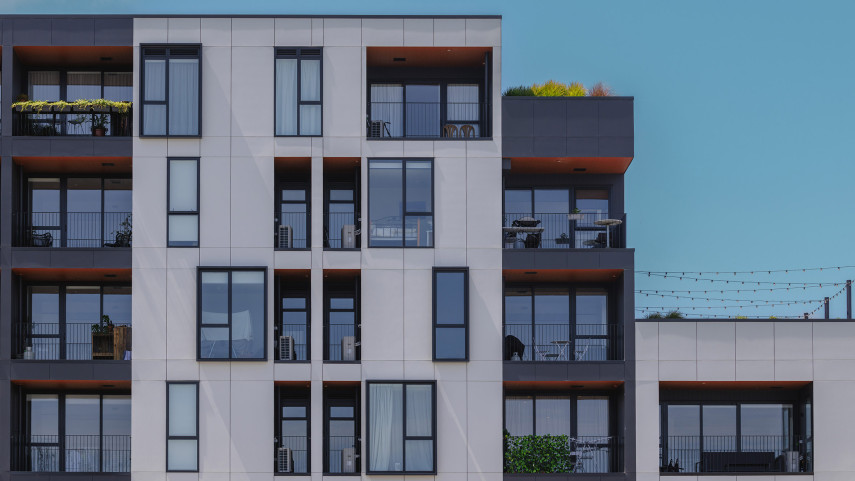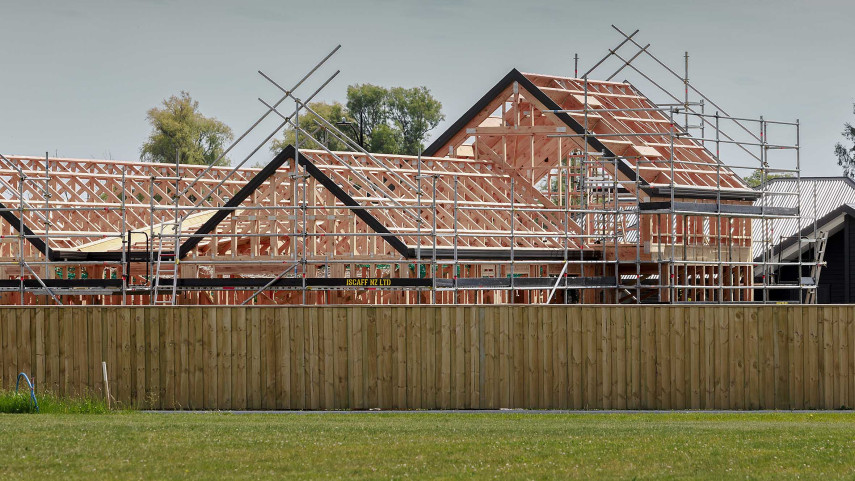Under the Building Act 2004, all residential or small heated pools (including temporary pools) must have compliant barriers to keep young children safe at all times.
Every residential pool filled or partially filled with water more than 400mm deep must have physical barriers that restrict access to the pool by unsupervised children under five years of age. The property owner and any tenants on a property where a residential pool is located are all responsible for ensuring these barriers remain compliant.Councils are required by the Building Act to ensure these residential or small heated pools are inspected at least every three years to determine they still have compliant pool barriers.
Register your residential or small heated pool
If you have a residential pool or a small heated pool, please ensure it is registered with the Council. There is no charge to register your pool.
Small heated pools with an acceptable cover(external link) do not need to be registered.

Building a new residential or small heated pool
If you are building a new pool, you will at least need a building consent for the barrier restricting access to the pool.
If you are thinking about installing a residential or small heated pool, or you have questions you cannot find the answer to on the MBIE website(external link), you can discuss your installation with our Duty Building Control Officer. Phone 03 941 8999 or email dutyBCO@ccc.govt.nz before you begin.
The acceptable solutions for meeting the building code for Means of restricting access to residential pools can be found on MBIE’s website(external link).
To ensure you have sufficient information when you apply for your building consent, refer to our Residential or small heated pool check sheet - Form B-054 [DOCX, 86 KB] (also available as a PDF [PDF, 53 KB]). This check sheet will need to accompany your application.
Getting a building consent does incur fees. Visit building consents fees(external link) for more information.
Barriers
Make sure your pool is always secure and safe by completing regular maintenance of your pool barriers and gates. Your pool barrier must:
- Restrict access to the pool and the immediate pool area.
- Be at least 1.2 metres above the ground and any permanent projections, such as steps, retaining walls, raised gardens, or objects placed on the ground within 1.2 meters of the barrier.
- Have no climbable features on the outside of the barrier or adjoining barrier that could be used for climbing unless they are spaced at least 900mm apart.
- Not have any gaps that exceed 100mm in or under it, including pet doors.
- Barriers using steel wire mesh up to 1800mm in height may only have maximum size openings of 13mm. If the barrier is at least 1800mm high, the opening dimension may be a maximum of 35mm.
For further solutions, especially where the pool barrier includes a building or boundary fence, see Acceptable Solutions F9/AS1 and F9/AS2(external link)
Inside the residential or small heated pool area
Non-pool-related items and activities cannot be located inside the pool area.
This includes:
- Clotheslines.
- Play equipment.
- Vegetable gardens.
- Dog kennels.
- General storage areas.
Gates
Gates into the pool area must:
- Open away from the pool area.
- Self-close and self-latch unaided from any distance.
- Comply with the rules for fences.
The gate latch must:
- Be a minimum of 1.5 metres above the ground and any objects within 1.2 metres of the barrier, if accessible from the outside of the pool barrier.
- Be inaccessible from the outside except by reaching at least 1.2 metres if mounted on the inside of the gate.
- Be at least 150mm from the top or be shielded if the latch is accessible only by reaching over the gate.
Around the residential or small heated pool area
- Ensure there are no trees that could assist young children in climbing the fence.
- External removable ladders must be disabled or removed after use.
- For pools installed after 1 January 2017, ladders are not allowed unless they are surrounded by a complying barrier and gate.
Residential or small heated pool register
All residential or small heated pools that do not have an acceptable cover must be registered(external link) on the Council pool register.
Small heated pools that have an acceptable cover(external link) do not need to be registered.
There is no charge to register your pool.
Once your pool is registered, we automatically schedule an inspection of your residential or small heated pool barriers approximately once every three years.
If you have obtained a building consent for your pool, your pool should already be registered, however, you can check this by emailing us at fspinspections@ccc.govt.nz
Let us know if you have removed a residential or small heated pool from your property(external link) so we can update our records and stop inspections.
Using a Council pool inspector
We automatically schedule an inspection for pool barriers approximately once every three years.
Around two weeks before the inspection, we will send you a letter advising of the inspection.
If an inspector has trouble accessing your property because of security restrictions or dogs, or if you want to be home when the inspector comes, you will need to contact us and book an inspection.
To book an inspection or enquire about a booked inspection for an existing pool, email fspinspections@ccc.govt.nz
An inspection fee is charged for each pool compliance inspection. As of 1 July 2025, fees are:
- Compliance inspection fee (subsequent inspections after initial inspection): $95.00
- Compliance inspection administration fee: $48.00
- Periodic inspection fee (s.222A, Building Act 2004): $95.00
An invoice will be sent to the address we have on record. If you have changed your address, phone us on 03 941 8999 to update your address details.
The invoice has details for how to pay for your pool inspection.
Using an independently qualified pool inspector
You can choose to use an independently qualified pool inspector(external link) instead of using a Council inspector.
The independently qualified pool inspector will issue you a certificate of periodic inspection certifying the pool barrier complies.
You can email your certificate to fspinspections@ccc.govt.nz, including your:
- full name
- address
- contact phone number
A compliance inspection administration fee of $48.00 is charged for the processing and recording of inspection results provided by an independently qualified pool inspector. An invoice will be sent to the address we have on record. If you have changed your address, phone us on 03 941 8999 to update your address details.
Email fspinspections@ccc.govt.nz if you want to use an independent qualified pool inspector.
Failed pool inspection
If your pool barrier fails the inspection, we will automatically book to re-inspect it 21 days later. If it is considered particularly dangerous, we will re-inspect it 48 hours later.
If our inspector comes to your property and cannot gain access to the pool area, we will still charge you for this site visit, and you will need to book a return assessment time.
Email fspinspections@ccc.govt.nz if you will not be able to complete the required work before your re-inspection.
Notice to fix
If we consider it necessary, we may issue a 'notice to fix' under the Building Act 2004 for a non-compliant pool barrier.
A $370 fee applies for issuing a notice to fix. This fee is charged in addition to the standard inspection fee.
If you do not comply with the Notice to fix, you could receive a $500 infringement notice or be prosecuted with a maximum fine of $20,000.
Payment of inspections
For completed inspections, an invoice will be issued and can be paid via internet banking or EFTPOS. Our internet banking details are provided below. Payments are credited to our account on the next business day.
- Bank: Bank of New Zealand
- Account Name: Christchurch City Council
- Account Number: 02 0800 0044765 03
The particulars, code and reference details are all specified at the bottom of the invoice. To avoid processing delays, please make sure you include all of this information in your payment details.
A small heated pool does not need an inspection every three years if it meets the following criteria:
- A water surface area of 5 square metres or less.
- 760mm high unclimbable sides, including no steps.
- A complying lockable lid that must:
- Be capable of supporting 20kg of weight at its centre.
- Have hold-down straps and fasteners capable of fixing the cover in place so there is no opening greater than 100mm.
- Have fasteners with a minimum main width of 33mm.
- Have a prominently displayed hazard warning notice, such as ‘Warning, this small heated pool cover must be kept locked except when under adult supervision.
- Be constructed with a slope from the centre to the outside to prevent water from collecting on top.
See Acceptable Solutions F9/AS2 [PDF, 703KB](external link) for further information.
Filling your residential or small heated pool
When filling your swimming pool or small heated pool, it’s really important you don't contaminate our water supply.
Backflow is one of the biggest risks to our public water supply and can seriously affect the quality and safety of our drinking water. As a property owner, you are legally responsible for making sure you do not contaminate the public water supply.
The potential risk of a backflow hazard from residential or small heated pools to the public water supply are:
- Below-rim inlets.
- Hoses left running and dropped into residential or small heated pools.
- Direct connections at chlorination equipment.
Residential or small heated pools are considered medium hazard in the acceptable solutions of the building code. You will need to install one of the following devices to prevent backflow from your residential or small heated pool to the water supply:
- A hose-tap vacuum breaker in the hose that feeds the swimming or small heated pool.
- A medium hazard backflow prevention device at the property boundary, where the water meter is located. A backflow prevention device of this type requires building consent before installation.
More information about backflow prevention(external link).
Talk to your pool supplier or local plumbing merchant about the right option for your swimming or small heated pool.
Emptying your residential or small heated pool
Residential or small heated pools contain chlorine and other substances that are harmful to the environment and toxic to fish. To protect our rivers, streams and wetlands, it’s important that only rainwater goes into our stormwater network.
It’s easy to do the right thing with your swimming or small heated pool water.
In Christchurch, permission isn’t needed to put swimming or small heated pool water into our wastewater (sewer) network.
All chlorinated water, saltwater and filter-backwash water must be discharged into the wastewater network via the pool plumbing to a gully trap.
There are also these things to consider:
- If you empty your swimming or small heated pool at the end of summer, please do it during dry weather, when the wastewater network is better able to cope with the extra flow of water.
- If your swimming pool or small heated pool is in-ground, you may need to take precautionary measures to address groundwater pressure on the empty pool.
- If you live on a flat rural property, your swimming or small heated pool can be emptied directly to the ground. You will need to take care that it does not drain into a watercourse or impact another property. It should also not drain into a septic tank system. We suggest that you check any chemical levels, in particular chlorine, to ensure they are low before emptying the swimming or small heated pool, as these can have an impact on plantings.
For advice on this, please email our planning team at DutyPlanner@ccc.govt.nz or phone 03 941 8999 and ask to speak to the duty planner.
Once your pool has been removed, please let us know, and we will take it off our register(external link).
Remove a residential or small heated pool from the register
Let us know if you have removed a residential or small heated pool from your property so we can update our records and stop inspections.

If you are thinking about installing a residential or small heated pool, or you have questions about pool barriers that aren’t answered here or on the MBIE website(external link), email fspinspections@ccc.govt.nz.
Related news

Christchurch named one-stop shop for supermarket consenting
Christchurch City Council has been selected to serve as the one-stop consenting authority for the country’s large scale supermarket developments.
26 Nov 2025
Christchurch withdraws from further housing intensification
Christchurch’s bid to opt out of further housing intensification has been accepted.
10 Nov 2025
New Council initiative to raise profile of eco buildings
Owners of energy-efficient buildings in Christchurch can now have that noted as a badge of honour on their property files.
27 Jun 2025